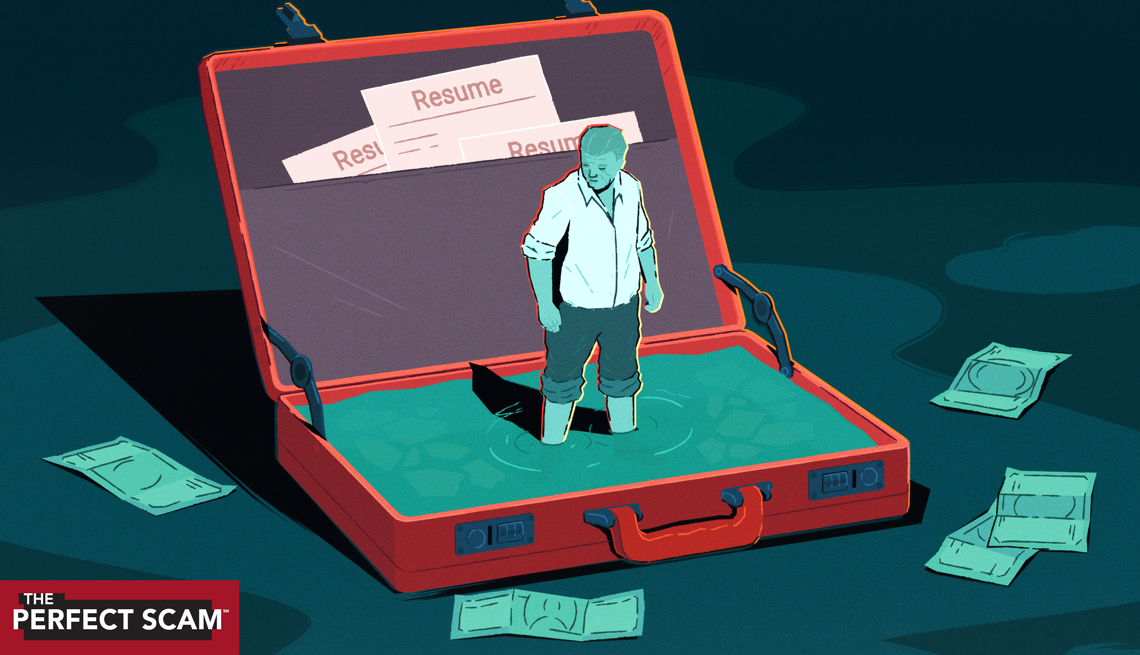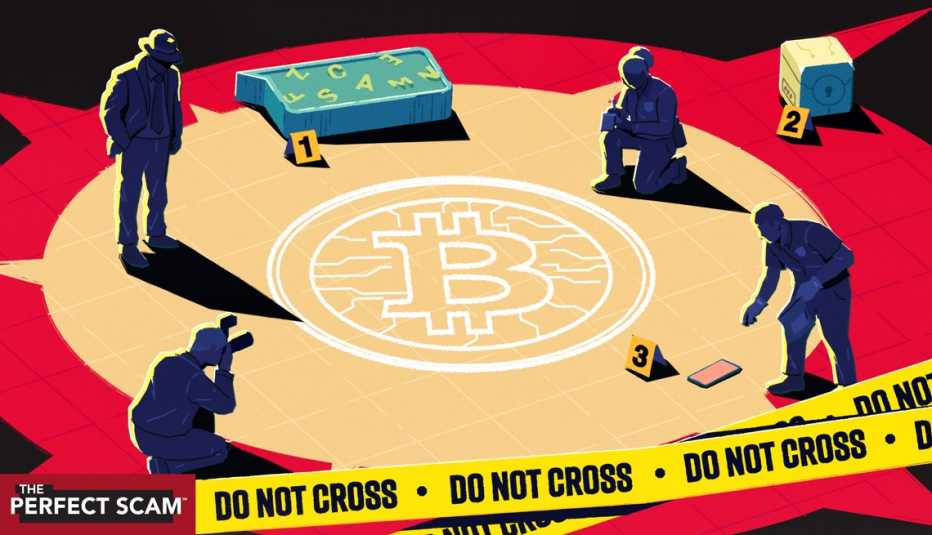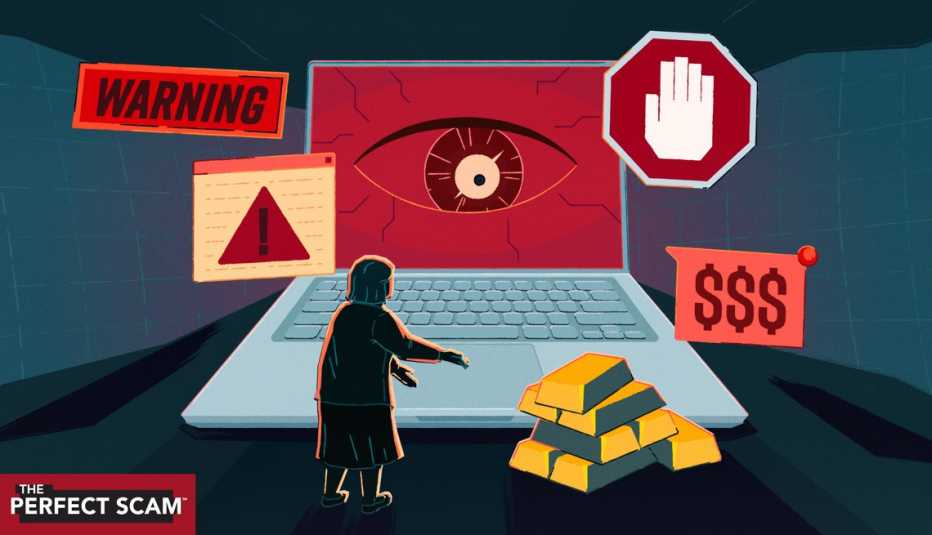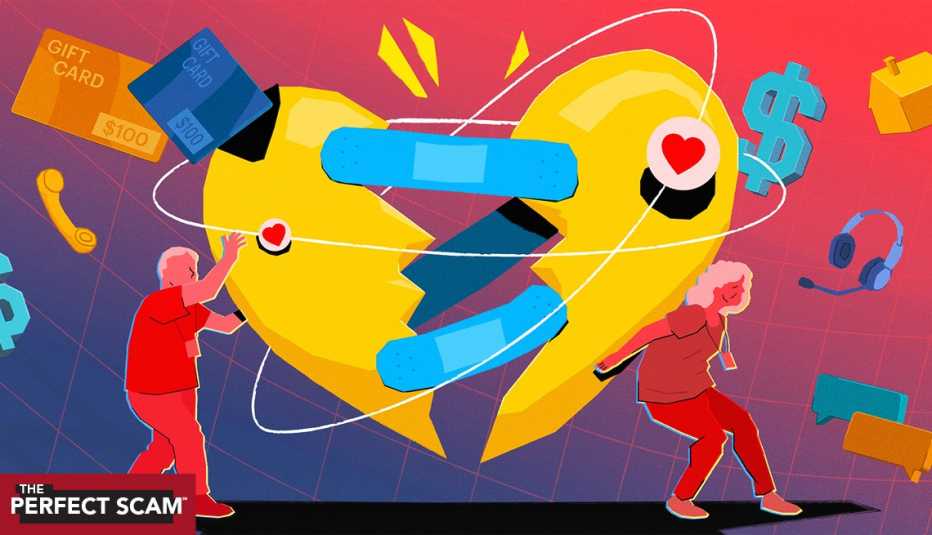AARP Hearing Center
Subscribe: Apple Podcasts | Amazon Music | Spotify | TuneIn
Job seekers all over the country answer ads for sales positions at a water filtration company. The offer is promising, and the contracts look professional. The only catch is the initial $5000 investment in a water purification unit. However, when the prepaid units never arrive, people begin to realize they are victims of a scam. They form a Facebook group, band together, and convince investigative journalist Lou Raguse to take up their cause. Will they get justice?

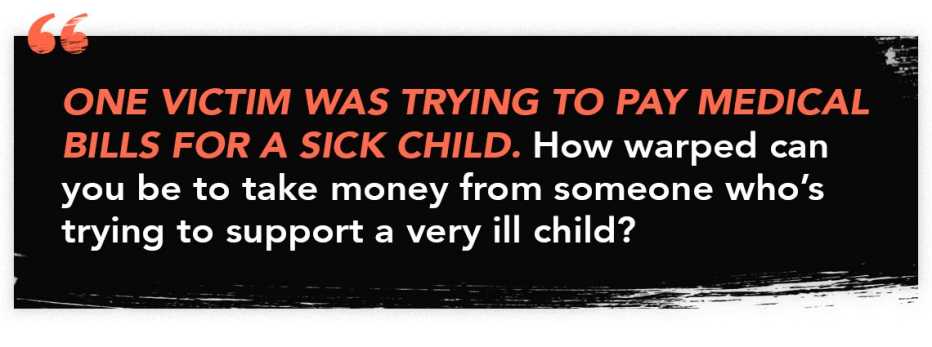
(MUSIC INTRO)
[00:00:01] Bob: This week on The Perfect Scam.
[00:00:04] Jay Brooks: I created a Facebook group. And it took off.
[00:00:09] Bob: They all had the same story, right?
[00:00:11] Jay Brooks: They all had the same story. Different names, he used different names, all the same story. Obviously, we're talking about the same guy.
[00:00:21] Jerry Cibley: The hardest part for me was listening to some of the other people on Facebook, and there were some people that did not have the money, that had borrowed this money. One was actually trying to pay medical bills for a sick child. How warped can you be to take money from someone who's trying to support medical bills for a very ill child?
(MUSIC SEGUE)
[00:00:48] Bob: Welcome back to The Perfect Scam. I'm your host, Bob Sullivan. You have to spend money to make money. You've probably heard that before, and there's truth to it. It's also true that entrepreneurs have to take risks and they don't always work out. That's why we call them risks. However, criminals can use these sentiments against you and today's story illustrates how even savvy, experienced business investors can get ripped off by criminals telling tall tales. I like the story a lot, however, because the victims band together and a dogged journalist takes up their cause and they all spend years chasing down justice. Okay, let's get to Jay Brooks. He’s had a couple of amazing careers.
[00:01:35] Jay Brooks: I used to deliver yachts for 10 years from New York and along the Eastern Seaboard to the Caribbean, primarily a, a lot of my business was delivering sailboats for the growing charter fleets, so I would deliver boats from the factory.
[00:01:56] Bob: So you would sail brand-new yachts from the East Coast down to the Caribbean, that was your job?
[00:02:01] Jay Brooks: That was my job.
[00:02:02] Bob: That sounds made up, I've got to say.
[00:02:04] Jay Brooks: (laughs) Yeah. And that's actually how I met my wife. She was on vacation in Florida, and she sailed with me for a couple of years, and then uh we decided we wanted to have a family, and she wanted to have a garden and get off of boats. And so yeah, we moved out here.
[00:02:27] Bob: Out here. Clear across the country to Napa, California.
[00:02:33] Jay Brooks: I didn't know what I was going to do. So I did construction, I worked at the newspaper, I drove a taxi, and then finally, this was about 1980-- 1988, um, I became employee number five in a new technology called cellular. It was Cellular One in those days. And I think when we, when I joined the company, they had maybe a thousand customers in the Bay Area, and when I left 20 years later, we had over 4 million. So...
[00:03:17] Bob: That's a lot of growth.
[00:03:18] Jay Brooks: Yeah. So I was, yeah, that was my career, it was the cellular, growing the cellular business.
[00:03:27] Bob: Jay had a great second career in mobile phones, but was forced to retire at age 65 and still putting kids through college he goes looking around for a third act.
[00:03:38] Jay Brooks: My career was sales; it was corporate sales. I ran sales teams and started off selling myself, but eventually ended up being a Director of Sales for corporate sales, so business to business, not consumer. And I had a lot of knowledge on how to build distribution channels and that's when I ran across...
[00:04:04] Bob: He runs across an ad for a company selling water purification devices and looking to quickly ramp up a sales staff.
[00:04:13] Jay Brooks: And decided after looking at the product, I started thinking, well this would be a good fit for health clubs and gyms, and I could build a distribution channel and become a distributor and have sales teams around different areas of California selling these things.
[00:04:32] Bob: Do you remember how you came across the company?
[00:04:34] Jay Brooks: It was on Craigslist.
[00:04:36] Bob: Craigslist might not sound like a traditional place to find a job, and that's why Jay does a lot of research on the company called WaterTek and its owner, a man named Michael Brunn.
[00:04:49] Jay Brooks: So I did a lot of investigating because I'm a pretty smart guy, I mean I found his bank, I looked at his banking information, I looked at his corporate information; everything looked real good, looked good.
[00:05:06] Bob: So did you ever meet him or talk to him or...
[00:05:08] Jay Brooks: Yes. I did speak with him a few times by phone.
[00:05:12] Bob: And tell me, what were your first impressions of him when you spoke to him on the phone?
[00:05:15] Jay Brooks: Pretty straight--, straightforward, intelligent, and not too chit-chatty, but friendly, and I, that gave me some confidence that he was a business person.
[00:05:29] Bob: So you probably asked him some pretty basic questions, right, about the future of the company or anything. Do you remember anything about the conversation?
[00:05:35] Jay Brooks: Basically that I would have distribution rights for the majority of Northern California. And that we would talk about stock and ownership of the company as our relationship and sales developed.
[00:05:55] Bob: Soon after, Jay gets a contract from Michael Brunn. It has a lot of detail.
[00:06:02] Jay Brooks: I have the Independent Contractor Agreement between WaterTek Marketing Corporation and myself. "The company hereby agrees to engage the contractor to provide the company with services consisting of executing a professional recruitment process as trained, and following up with company-provided candidates in a timely fashion, engaging in the process of training and supporting new associates who entered the business through the contractor's recruitment efforts."
[00:06:37] Bob: So Jay signs the deal which has one very specific requirement.
[00:06:44] Jay Brooks: Yeah, I had to buy a unit.
[00:06:46] Bob: Ah. A water purifier unit, right? How much did that cost?
[00:06:50] Jay Brooks: 5000.
[00:06:52] Bob: $5000. Okay, and then so you were going to get this unit and then what, you go to a health club store and sell them the unit for a thousand?
[00:06:58] Jay Brooks: Well I, the plan was, it was outlined in the contract, is that I would get the unit, get used to it, and then I would be paid $2500 for the first 30 days under the contract in addition to the minimum base pay of a commission of $100 for each new distributor that I sign onto the team.
[00:07:27] Bob: Aha.
[00:07:28] Jay Brooks: Okay, so I wasn't actually going to be selling the units, I was going to be recruiting salespeople.
[00:07:37] Bob: Got it. Got it, okay.
[00:07:38] Jay Brooks: And then I'd be making a commission for each person that I brought on. And then I would be paid a guaranteed minimum base pay of $4000 per month in addition to the commission of $100 for each new distributor that I signed onto my team.
[00:08:01] Bob: This sounds like a pretty good deal, guaranteed payment that's not so bad, but also a big territory, right?
[00:08:06] Jay Brooks: Oh yeah, right. Yeah.
[00:08:10] Bob: At about the same time, Jerry Cibley who lives in Florida, is also perusing the internet for a new opportunity.
[00:08:18] Bob: Tell me the first time you heard about this water system.
[00:08:21] Jerry Cibley: I was reading Craigslist, and I don't know why I was on Craigslist, because it was not something that I did regularly, but all of a sudden, I saw an advertisement that just grabbed my attention. And the advertisement was for a demonstrator/salesperson to sell these high-end water systems. And what intrigued me was the fact that they said a $6,000 per month guarantee. Now everybody knows if it sounds too good to be true, it can't be true. But I decided what's five minutes out of my day to investigate.
[00:09:06] Bob: So that's what you do.
[00:09:07] Jerry Cibley: That's what I did. Sent an email and I received an email back in a short period of time from a woman by the name of Mia, and she said that she was a headhunter. I'd had a lot of prior experience of working with headhunters, and she sounded very professional. She said she'd actually worked for this company at one point in time before she was in the headhunting business. And what they were looking for was a person who would be able to do presentations at hotels. And of course I said to her, "That's great, but who fills up these seats?" And she said, "We do. We have a full-time marketing department, and we will fill the seats. We'll also pay for the room, and all we need you to do is show up, do your dog and pony show," as they call it in the industry, "and then you will do your closing of these warm leads in in-home sales." And I said, "Wow, that sounds amazing. How do we get started?" She said, "I need to do a background check on you," and at that point in time I said wow, this, this is a very professional company. They're using headhunters, employment agents, they are using a company to determine if you are a viable character. Obviously, what they were doing was a, probably a soft credit pull in retrospect to find...
[00:10:33] Bob: But they did, they did, they vetted you essentially, right?
[00:10:35] Jerry Cibley: They totally vetted me. And I then got back in touch with her. She reiterated the fact that they would pay, they would fill the seats. I would get training and I needed to talk with the boss man.
[00:10:51] Bob: So Mia connects Jerry with a man in charge of the company. David Mueller. They talk on the phone.
[00:10:58] Bob: Tell me about his voice, like what was your first impression of him?
[00:11:01] Jerry Cibley: Again, extremely profession. He knew what he was talking about. He understood the industry; he understood sales and marketing. He was a type of guy that he was credible. He was 100% credible, and I felt comfortable with him. And his company was Mile High H₂O, and he was out of Colorado.
[00:11:23] Bob: Mile High H₂O. That's a good name. What was the product and what were you actually selling?
[00:11:28] Jerry Cibley: It was a product to ionize water, and it was a Japanese product originally, and they had brought it into the United States, and people feel that it was a type of water that would give you improved health, and it wasn't a charlatan sort of thing that it would cure blindness and rheumatism, things like that as... it was legitimate. I read about it. I saw a bunch of videos and spoke to a gentleman who was involved in the industry, and he was able to verify that this type of water treatment was legitimate.
[00:12:02] Bob: The opportunity sounds great, but there is one caveat.
[00:12:09] Jerry Cibley: And the only caveat was that I needed to buy a machine. And I said, "I really don't need one of these machines," but he said, "Well you have to be able to demonstrate." And I said, "Okay, that's logical." He said, "But listen, if you ever leave the company and you don't want the machine anymore, our contract states that we will hold your money in escrow and that any time you want we will refund your money." And I said, "Okay, I'd like to see the contract."
[00:12:42] Bob: So Jerry gets a long look at the contract.
[00:12:45] Jerry Cibley: So it was good. And after we talked a couple of times, he said, “I want you to think about this opportunity," gave me outs, made it very reasonable that he was legitimate. And I just could not see myself in any other position than to believe in him.
[00:13:06] Bob: Jerry believes in David Mueller enough to make plans for that first sales conference.
[00:13:12] Jerry Cibley: The first meeting we were supposed to have and he was coming in for training, and he even said he would pay his own way in, and he'd pay his own travel expenses, and he would pay his own hotel, and he would even take me out to dinners, which sounded good to me. And that we would do the first training live with a group and he had it scheduled for somewhere around Thanksgiving. And being in sales and marketing, I said, "That seems to me a difficult time." He said, "No, we're very certain that we can fill up the room." I said, "Okay. If you feel that you can fill up this room, then I'm game. I have nothing to lose." So I ordered the machine. I wrote him a check for; I think it was $5000 and some cents.
[00:13:58] Bob: So you send the money...
[00:14:00] Jerry Cibley: I wait.
[00:14:00] Bob: Like Jay, Jerry waits for delivery of his machine. They both wait and wait and wait.
[00:14:10] Jerry Cibley: And then he gets back in touch with me saying, "Jerry, we've had some sort of conflicts. We're having problems getting machines right now. I can assure you there's nothing wrong." And again, my antenna went up a little bit, but he called me and he said, "Maybe the fact that it is Thanksgiving, maybe that's not a bad idea. We'll postpone it for a month, and I give you my heartfelt apologies, but we have some things that we are having some issues with, and we have to somehow get them under control before we can move forward." And then he went silent.
[00:14:44] Bob: Hmm.
[00:14:47] Bob: When David Mueller stops answering calls, stops responding at all, Jerry gets very concerned.
[00:14:55] Jerry Cibley: And I started doing some deep investigation only to find out that according to everything that I could find on the internet about this man is that there really wasn't a David Mueller, and he really wasn't in Colorado. And that not only that, but he was being sued at the time for representing that he was part of the Kangen Water group where he was not. I called Kangen. I was able to verify that he was not even an authorized distributor.
[00:15:33] Bob: At roughly the same time, Jay is sensing trouble too.
[00:15:37] Jay Brooks: I was supposed to receive the unit within two weeks after receipt of my investment. And I have receipts from his bank, I have the DocuSign contract, I had everything in line, and the unit never came.
[00:15:57] Bob: The unit never came, wow.
[00:15:58] Jay Brooks: Yep. 'Cause I eventually got in touch with the actual WaterTek company, and they told me they'd been trying to get rid of this guy, they didn't know who he was, they've, they've tried to file suit against him to stop him from using their product. So he just picked somebody else's product and went out and represented it at his, as his own.
[00:16:22] Bob: So Jay reaches out to Michael Brunn who, at first, has an explanation.
[00:16:28] Jay Brooks: And pretty much he never returned my calls and started making excuses about, that he did respond to several of my emails making excuses and promising that it was coming, stringing me along.
[00:16:44] Bob: Stringing him along with many refunds of his $5000 payment.
[00:16:50] Jay Brooks: I told him that I'm doing this, I'm doing this. I want my money. And he started sending me you know he had promised, okay, it's next week you're going to get 2000, and he would send me a money order for $200. And I'd go back and say, this is nonsense. I need a minimum of $2500, and a payment plan after that or I need the whole amount. And he promised to do it, and then he would send me another money order for $300. I think totally I was reimbursed maybe close to $1000 before he just disappeared.
[00:17:35] Bob: Jay, still out $4000, gets fed up with waiting.
[00:17:42] Jay Brooks: And after a month or so, I realized I'm never going to get this unit, and that's when I started, the first thing I did was I contacted the attorney general for the State of California and started working with them to provide them information about him and his company, and then finally probably a couple of months later, they told me that they had everything they needed from me and didn't know what, how much I could actually do because he was located in what, Minnesota?
[00:18:25] Bob: Ah, yeah, sure.
[00:18:25] Jay Brooks: So then I contacted the attorney general in his state and started working with them, uh, and then they realized, because they were getting other, many other complaints that it was time that, their suggestion was that I start working with the FBI. And so they gave me a contact in the FBI and I started working with the FBI and they were very good.
[00:18:58] Bob: But as he's waiting for law enforcement to investigate, Jay takes matters into his own hands.
[00:19:04] Jay Brooks: I created a Facebook group inviting other people who had been scammed by him. And it took off.
[00:19:15] Bob: Members start swapping tales. David Mueller, Michael Brunn, WaterTek, Mile High H₂O Corporation. There are a bunch of different names, but...
[00:19:25] Bob: But they all had the same story, right?
[00:19:26] Jay Brooks: They all had the same story. Different names, he used different names, all the same story. Obviously, we're talking about the same guy.
[00:19:37] Bob: But the victims are all different, and some of their stories are tragic.
[00:19:43] Jay Brooks: That's where I could see how the breadth of his criminality, and it was heartbreaking to read some of these stories. I'm talking single mothers, people who invested money they didn't have. Yeah, he ripped off a lot of people. And I was probably one of the people who could most afford it. $5000, believe me, my wife was pissed at me for a year.
[00:20:12] Bob: Jerry Cibley also found his way to this Facebook group.
[00:20:17] Jerry Cibley: The sad part about this, the hardest part for me was listening to some of the other people on Facebook, and there were some people that did not have the money, that had borrowed this money, that couldn't afford to be scammed out of it. One was actually trying to pay medical bills for a sick child. How warped can you be to take money from someone who's trying to support medical bills for a very ill child?
[00:20:44] Bob: This group of victims from all over the country, they hadn't just reached out to the attorney general's office or to each other on Facebook, they reach out to a tough investigative reporter who decides to take up their cause.
[00:20:59] Lou Raguse: My name's Lou Raguse. I'm a reporter in Minneapolis at K-A-R-E, which we call KARE11, the NBC affiliate in Minneapolis. I do a lot of crime and court stories, and some investigative stories as well as general daily reporting, whether and storms, and you name it.
[00:21:16] Bob: You probably do a little of everything, right/
[00:21:18] Lou Raguse: Yep.
[00:21:19] Bob: Lou gets the story thanks to that tip.
[00:21:24] Lou Raguse: It was probably something in late 2018 or early 2019, and I do some work for the KARE, they call it KARE11 Investigates, it's our investigation unit. And our investigative producer is, at that time, he's retired now, is Steve Eckert, and he worked with Dateline NBC for many years. He had taken the initial tip, which was somebody from, I believe Las Vegas, who had reached out and said, hey, a bunch of us are getting scammed by a guy who we think is based in Minnesota. Can you help because we're not getting any help from the authorities. And that's part of what made it so difficult was the fact that these victims were so scattered across the country. But they first united in a Facebook group, a private Facebook group where they could communicate with each other and then they went to the media from there.
[00:22:11] Bob: I'm guessing initially that might have been a hard story to sell if the victims weren't in your local area, right?
[00:22:17] Lou Raguse: Yeah, you're exactly right. From journalism manager, or our news managers, they, it's less enticing when the victims are not from your home area, but it was the sheer number of them, and we created this graphic that showed a map of the United States with all these spots where the victims were and their actual faces after we conducted all these interviews. That really hit it home for our manager; wow, this is having an impact on a lot of different people.
[00:22:45] Bob: As Lou runs down victims, conducts dozens of interviews, the depth of the scam becomes obvious.
[00:22:52] Lou Raguse: Well the scam was the money they paid for the unit, because only a couple people actually got the unit, and it was very suspicious in the way that they did get it. It wasn't like they received it straight from the company. But the scam was, they would lose either $3000 or $5000 and the person behind the scam would pocket that money. But the loss to the people ended up being much more, because a lot of them like quit their job that they were at or stopped looking for other opportunities because they thought this was going to be a thing. The effect was just enormous where people lost other salary or other income that they would have had. One woman, it caused so much stress in her marriage that she got divorced as a result. Just, just things like that. One guy thought that he would be homeless as a result because he thought this was, he was so confident it was something he could do that he scraped together enough money to get the unit, never got it, the job opportunity never materialized and that was it.
[00:23:49] Bob: Maybe spent his last $5000 on this last chance?
[00:23:53] Jay Brooks: Exactly. One guy had a boy who was getting cancer treatment, and so there's all these different hardships that I'm sure the person behind the scam himself didn't think about, and that's trou--, what we tried to illustrate in our story, and that's how you show the effect that this has on people. It's more than just a, a $3000 or $5000 one-off loss.
[00:24:16] Bob: Despite the elaborate cover stories, the contracts, the phone calls, the crime was relatively simple. Someone is taking entrepreneurs' money and not delivering on their promises. But not so simple, figuring out who is really behind this scam. Victims all had slightly different stories.
[00:24:36] Lou Raguse: So Michael Brunn, David Mueller, there were a couple of other names, and so they were telling me that these guys, plural, are running this thing, and I have access to databases and I've created my own databases of people that live in Minnesota, and there actually was one Michael Brunn in the state of Minnesota, and I reached him, and he definitely was not this guy. And so I was skeptical that David Mueller and Michael Brunn were real people.
[00:25:04] Bob: And that skepticism leads Lou Raguse on a wild goose chase to find the man who is really responsible for WaterTek or Mile High H₂O, or whoever and whatever is behind the crime. Does Lou get his story? Do the victims get their money back? Well that's next week on The Perfect Scam.
(MUSIC SEGUE)
[00:25:32] Bob: If you have been targeted by a scam or fraud, you're not alone. Call the AARP Fraud Watch Network Helpline at 877-908-3360. Their trained fraud specialists can provide you with free support and guidance on what to do next. To learn more about the Fraud Watch Network volunteers and the fraud survivors they've helped, check out the new video series, Fraud Wars, on AARP's YouTube channel. Our email address at The Perfect Scam is: theperfectscampodcast@aarp.org, and we want to hear from you. If you've been the victim of a scam or you know someone who has, and you'd like us to tell their story, write to us. That address again is: theperfectscampodcast@aarp.org. Thank you to our team of scambusters; Associate Producer, Annalea Embree; Researcher, Becky Dodson; Executive Producer, Julie Getz; and our Audio Engineer and Sound Designer, Julio Gonzalez. Be sure to find us on Apple Podcasts, Spotify, or wherever you listen to podcasts. For AARP's The Perfect Scam, I'm Bob Sullivan.
(MUSIC OUTRO)
END OF TRANSCRIPT

































































